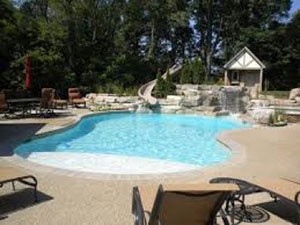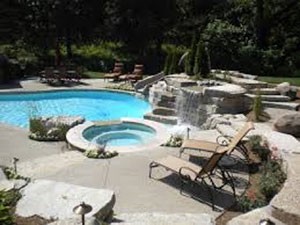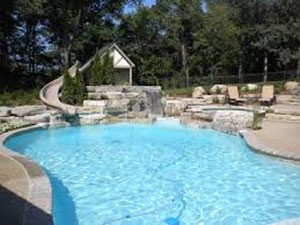Gunite Pool Construction
NOTICE: Through the years, we have offered Gunite pools as an option. However, CURRENTLY WE ARE NOT OFFERING THIS TYPE OF CONSTRUCTION due to certain logistics including labor, availability and pricing. Still we want to supply you with the following information for comparison purposes.)
We began offering gunite pool construction in the Jackson, MS area in the late 1980’s. One of the first things many people ask us is, “What’s the difference between fiberglass pools, vinyl liner pools, and concrete or gunite pools?”
Here you will find the advantages and disadvantages of gunite pools, how gunite pools are installed, and how gunite pools hold up in the clay soil found in the Jackson, MS area.

Gunite Pool Advantages:
- Almost unlimited design. Gunite pools can be any size, shape, or depth. They also allow for more flexibility
with design features. Vanishing edges, beach entries, tanning ledges, etc. are all just a sketch away from reality with gunite pools.
Gunite Pool Disadvantages:
- Higher initial cost. Gunite pools cost on average $10,000.00 – $20,000.00 more than a comparable sized vinyl liner pool.
- Highest lifetime repair cost. Concrete or gunite pools will need to be renovated every 8-15 years. This involves resurfacing and re-tiling the pool at an expense of $10,000.00 -$15,000.00 or higher depending on the pool.
- Highest yearly maintenance. Because the surface of concrete pools is porous, additional maintenance and chemicals are required to prevent algae. The alkaline and pH of the pool shell also constantly raises the pH of the water, requiring the frequent adding of acid to counteract this effect.
- Longest installation time. Gunite pools usually take about 2 months to build. This, of course, is only an average as some projects take longer.
- Draining pool can be dangerous. Due to the nature of the product, care must be taken when draining a gunite pool. If the water table (ground water) is high, a gunite pool can be lifted out of the ground, causing extensive damage, if not drained properly.
- Warranties are not backed by any manufacturer. The warranty on gunite pools are backed by the builder of the pool and not backed by any manufacturer. All materials used by the builder carry no warranty. Thus any warranty given is usually short and varies in its protection from builder to builder.
How Concrete (Gunite) Pools are Installed – A Simplified Summary

- After laying out the pool, an excavation crew digs a hole according to the pool’s specification.
- Steel rebar is tied together to form a steel grid.
- This is one place a pool builder can separate themselves from other builders. It’s customary to set the grid on 12” centers. This works great for areas without clay, moving soil. However, here in Jackson, MS, where the clay soil shifts and, at times, seems to be in constant movement, a stronger pool is needed.
- What We Did: We build our steel frame on 8” centers. Thus we are using 1.5 times as much steel in every pool. More steel, stronger pool.
- Plumbing inlets and outlets are set in the walls.
- What We Did: We use all 2” pluming on both the suction and return sides for better circulation and to reduce strain on the pool equipment, producing less electricity usage. In addition, we us only schedule 40 pipe and fittings.
- Gunite or concrete is blown into the grid, forming the pool’s shell.
- This is another place a pool builder can separate themselves from other builders. It’s customer for the walls of the pool to be 4-6” thick and the bottom of the pool to be 6-8” thick. However, here in Jackson, MS, where the clay soil shifts and, at times, seems to be in constant movement, a stronger pool is needed.
- What We Did: We pour your entire pool 8” thick, walls and bottom. Thus we use up to 2 times as much concrete as other builders. Thicker concrete, stronger pool.
- Plaster is then installed on the gunite to provide a smoother, watertight surface.
- There are choices of plaster. These choices range from adding color to traditional plaster or upgrading to products that are smoother and last longer.
- The pool’s equipment is installed. You have many equipment options. Ask questions and make sure you are getting what you expect.
- This is yet another place a pool builder can separate themselves from other builders. Every customer deserves to know the equipment options they have. Be sure to ask about energy efficiency, as some pieces of equipment can cause you to use double the amount of electricity. In addition, make sure you are getting name brand equipment, not inexpensive knock-offs or inferior brands.
- What We Did: We inform you of your choices and only use name brand equipment. Currently we use Hayward and Pentair equipment, the two leading brands in our industry.
- The pool deck is formed and prepared for concrete to be poured.
- Here again a pool builder can separate themselves from other builders. Although no concrete deck carries any warranty against cracks, regardless of who pours or prepares it, certain practices in preparing the deck can help in preventing cracks and breakage.
- What We Did: We provide deck supports any time a pool deck is poured on ground that has been disturbed or had fill dirt added. In addition, concrete wire is installed in every deck along with moisture beerier. These practices add an addition level of protection against cracks and breakage.
Gunite Pools and the Clay Soil in the Jackson, MS Area
 If built with the clay soil in mind, gunite pools can hold up well in the Jackson, MS area. What does it mean to build a gunite pool “with the clay soil in mind?” It means to build the pool using materials and practices that have the best chance of withstanding the pushing and pulling of the clay soil. Some of these practices are:
If built with the clay soil in mind, gunite pools can hold up well in the Jackson, MS area. What does it mean to build a gunite pool “with the clay soil in mind?” It means to build the pool using materials and practices that have the best chance of withstanding the pushing and pulling of the clay soil. Some of these practices are:
- Using additional steel and concrete to reinforce the pool
- Using deck supports, wire and superior concrete mixes to pour the pool deck
While no claims can be made that this is the only way to build in clay soil, it can be said that these are best practices. In addition, these practices can produce a gunite pool that can handle the shifting of the clay soil.
(Disclaimer: Shifting and movement by clay soil can cause any type of construction to have issues. The statements made here are not meant to indicate otherwise.)
For some detailed information about each type of construction, click on the following links:
Vinyl Liner Fiberglass


 If built with the clay soil in mind, gunite pools can hold up well in the Jackson, MS area. What does it mean to build a gunite pool “with the clay soil in mind?” It means to build the pool using materials and practices that have the best chance of withstanding the pushing and pulling of the clay soil. Some of these practices are:
If built with the clay soil in mind, gunite pools can hold up well in the Jackson, MS area. What does it mean to build a gunite pool “with the clay soil in mind?” It means to build the pool using materials and practices that have the best chance of withstanding the pushing and pulling of the clay soil. Some of these practices are: